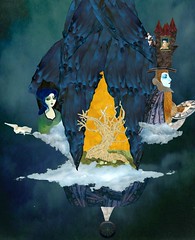
some notes:
"Voudoun has given woman, in the figure of Erzulie, exclusive title to that which distinguishes humans from all other forms: their capacity to conceive beyond reality, to desire beyond adequacy, to create beyond need. In Erzulie, Voudoun salutes woman as the divinity of the dream, the Goddess of Love, the muse of beauty." 138The Divine Horsemen
One of the most striking aspects of the traditions surrounding the devotions to Erzulie is that they always end with her weeping. Erzulie is lovely, beautiful, and she has the adoration of all men, yet she does not strike hateful jealousy in the women, because of her child-like innocence. She induces wonder and care, she is like a child. And, though she begins all celebrations in her honor filled with giddiness and pleasure at the excess of beautiful and expensive things that are always lavished on her parties, she slowly grows sad, accusing the people of not honoring her enough, not giving her enough, not loving her enough. In Maya Deren's book "The Divine Horsemen," she suggests that this is just another aspect of her child-like behavior (along with an "impatience with economies, with calculation, even with careful evaluation" 139), that you cannot give a child enough attention to satiate its need, and that those present at the devotions understand this and soothe her. I feel, however, that perhaps Erzulie is right. We do not devote enough of our attentions to child-like wonder, to endless and all-enveloping love--if we did, the world would be a much different place.
In Candomblé Ketu, Ewá represents the water element, and is the goddess of enchantment, beauty, and harmony. Like Erzulie, in the related Voodoo pantheon, she is universally loved and loving and "represents all that is fragile and sensitive." According to Morwyn, in Magic from Brazil, "Euá was so beautiful that men would fight to the death to possess her. In order to stop the carnage she changed herself into a puddle of water that evaporated to the sky, condensed into a cloud, and fell as rain. Thus she is known as the deity of transformation."
Here, I am fusing the two water divinities, hoping for a major transformation such as the one Erzulie begs for, one in which I no longer need to mess with stupidities like balancing my checkbook, for example... She is still paired with the Green Lion of alchemical transformation, and they rest beside Legba's tree, which opens the doors to the other worlds. If you look closely, you can see the first bird forming from the clouds billowing up from her scarf.
More on Erzulie, Ewa, and Legba here and here.















Fantastic. Wow Zoe, this is incredible.
ReplyDeleteLove Renee xoxo
cool
ReplyDeleteVery beautiful Zoe! Thanks so much for your visit and Happy Thanksgiving to you too!
ReplyDeleteYour funny Zoe.
ReplyDeletexoxo
Did you know you can create short links with Shortest and make dollars for every visit to your short links.
ReplyDelete